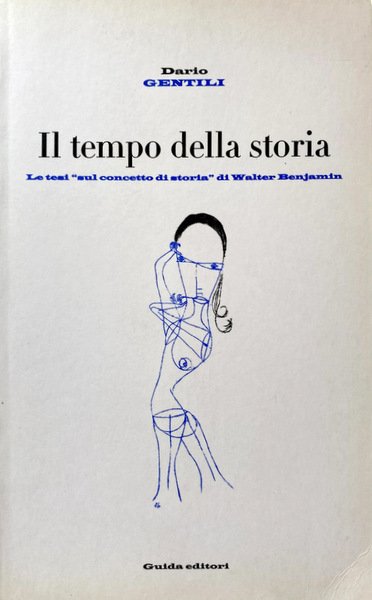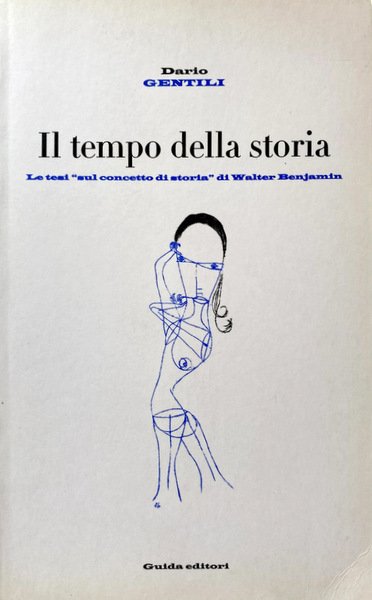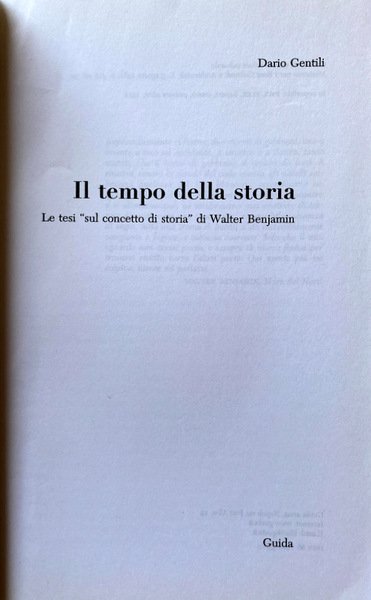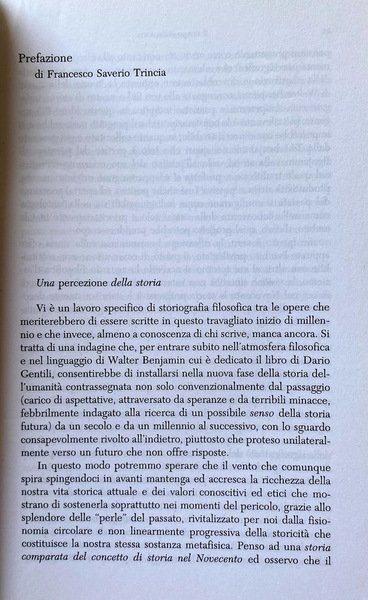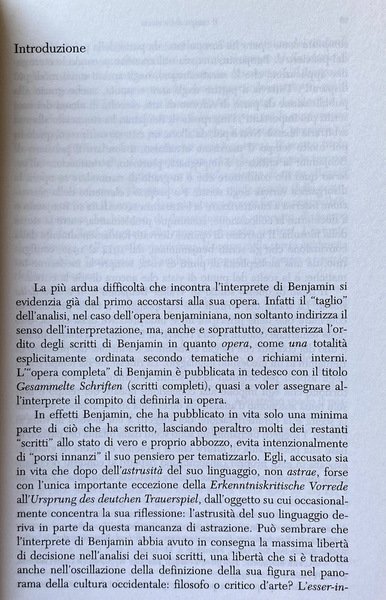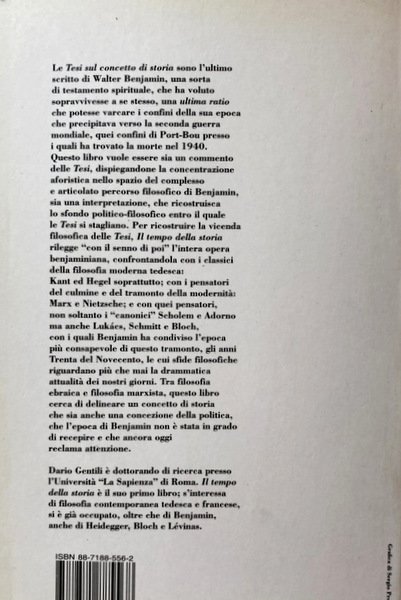IL TEMPO DELLA STORIA. LE TESI «SUL CONCETTO DI STORIA» DI WALTER BENJAMIN
IL TEMPO DELLA STORIA. LE TESI «SUL CONCETTO DI STORIA» DI WALTER BENJAMIN | Rare and modern books | Dario Gentili
IL TEMPO DELLA STORIA. LE TESI «SUL CONCETTO DI STORIA» DI WALTER BENJAMIN
IL TEMPO DELLA STORIA. LE TESI «SUL CONCETTO DI STORIA» DI WALTER BENJAMIN | Rare and modern books | Dario Gentili
Payment methods
- PayPal
- Credit card
- Bank transfer
- Pubblica amministrazione
- Carta del Docente
Details
- Year of publication
- 2002
- ISBN
- 9788871885568
- Place of printing
- NAPOLI
- Author
- Dario Gentili
- Volume
- 1
- Series
- Volume 11 di Strumenti e ricerche
- Publishers
- GUIDA EDITORI
- Size
- 22 cm
- Keyword
- Storiografia filosofica, Saggi, Storia, Filosofia, Tempo, Tesi, Dialettica, Memoria, Passato
- Binding description
- BROSSURA
- Dust jacket
- False
- State of preservation
- New
- Languages
- Italian
- Binding
- Softcover
- First edition
- True
Description
DISPONIBILITÀ GARANTITA AL 99%; SPEDIZIONE ENTRO 12 ORE DALL'ORDINE. RIMANENZA DI MAGAZZINO PARI AL NUOVO.
Le tesi Sul concetto di storia sono l’ultimo scritto di Walter Benjamin, una sorta di testamento che ha voluto gli sopravvivesse; una ultima ratio che potesse varcare i confini della sua epoca che precipitava nella Seconda guerra mondiale, quei confini di Portbou presso cui ha trovato la morte nel 1940. Questo libro vuole essere sia un commento delle Tesi, dispiegandone la concentrazione aforistica nello spazio del complesso e articolato percorso di pensiero di Benjamin, sia una interpretazione, che ricostruisca lo sfondo politico e filosofico entro cui le Tesi si stagliano. Per ricostruirne la vicenda filosofica, Il tempo della storia rilegge a ritroso l’intera opera benjaminiana, confrontandola con i classici della filosofia moderna tedesca, Kant ed Hegel soprattutto; con i pensatori del culmine e del tramonto della modernità, Marx e Nietzsche; e con quei pensatori, non soltanto i “canonici” Scholem e Adorno, ma anche Lukács, Schmitt e Bloch, con i quali Benjamin ha condiviso l’epoca più consapevole di questo tramonto, gli anni Venti e Trenta del Novecento. Tra filosofia ebraica e filosofia marxista, questo libro cerca di delineare un concetto di storia che sia anche una concezione della politica, che l’epoca di Benjamin non è stata in grado di rendere attuale e che ancora oggi conserva intatta la sua potenza.
The thesis "On the concept of history" is the last writing of Walter Benjamin, a kind of testament that he wanted to survive; a last resort that could cross the boundaries of his era that precipitated the Second World War, those borders of Portbou where he found death in 1940. This book is intended to be both a commentary of the Theses, deploying the aphoristic concentration in the space of Benjamin's complex and articulated path of thought, and an interpretation, which reconstructs the political and philosophical background within which the Theses is Stagliano. To reconstruct its philosophical story, The Time of History rereads the entire Benjaminian work backwards, comparing it with the classics of modern German philosophy, Kant and Hegel above all; with the thinkers of the climax and sunset of modernity, Marx and Nietzsche; and with those thinkers - not only the "canons" Scholem and Adorno, but also Lukacs, Schmitt and Bloch - with whom Benjamin shared the most conscious era of this sunset, the twenties and thirties of the twentieth century.
Descrizione bibliografica
Titolo: Il tempo della storia. Le tesi «Sul concetto di storia» di Walter Benjamin
Autore: Dario Gentili
Prefazione di: Francesco Saverio Trincia
Editore: Napoli: Guida Editori, Febbraio 2002
Lunghezza: 264 pagine; 22 cm
ISBN: 8871885562, 9788871885568
Collana: Volume 11 di Strumenti e ricerche
Soggetti: Storiografia filosofica, Saggi, Concetto di Storia, Senso, Novecento, Filosofia sociale e politica, Gesammelte Schriften, Scritti completi, Percezione, Tempo, Tesi, Uber den Begriff der Geschichte, Spazio, Teleologia, Wissenschaft, Kant, Hegel, Logik, Attesa, Eterno ritorno, Nietzsche, Cronista, Erzahler, Verità, Sogno, Speranza, Dialettica, Moda, Memoria, Conoscibilità, Passato, Tradizione, Erkenntniskritische Vorrede, Carl Schmitt, Progresso, Taumazein, Angelus Novus, Salvezza, Felicità, Agesilaus Santader, Kritik des Gothaer, Fourier, Regresso, Preistoria, Marx, Messianesimo storico, Theologische-politisches Fragment, Monade, Choc, Rivoluzione, Terrore, Eingedenken, Giorni di festa, Alesa, Adorno, Bloch, Geist der Utopie, Utopia, Meta, Origine, Libri Vintage, Fuori catalogo, Libri rari, Filosofia ebraica, Marxismo, Räumen, Messianismo, Philosophical historiography, Essays, Concept of History, Sense, Twentieth century, Social and political philosophy, Complete writings, Perception, Time, Thesis, Space, Teleology, Anticipation, Eternal return, Chronicler, Truth, Dream, Hope, Dialectic, Fashion, Memory, Knowability, Past, Tradition, Progress, Salvation, Happiness, Withdrawal, Prehistory, Historic Messianism, Monad, Shock, Revolution, Terror, Days of celebration, Destination, Origin, Books out of print, Rare books, Jewish philosophy, Marxism, Messianism
Dario Gentili è docente di Filosofia morale presso l’Università Roma Tre. Tra i titoli pubblicati si ricordano Il tempo della storia. Le tesi “sul concetto di storia” di Walter Benjamin (Guida, 2002), Topografie politiche. Spazio urbano, cittadinanza, confini in Walter Benjamin e Jacques Derrida (Quodlibet, 2009), Italian Theory. Dall'operaismo alla biopolitica (il Mulino, 2012), La crisi del politico (Guida, 2015) e Crisi come arte di governo (Quodlibet, 2018).
